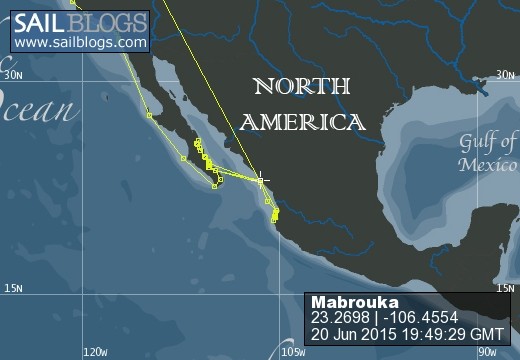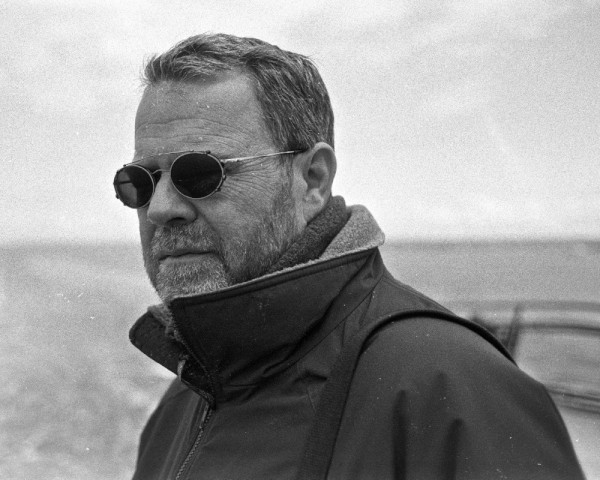

Blessed Lady
This is the cruising blog of the sailing yacht Mabrouka. The Favorites in the side bar allow those with discriminating taste to filter for just the stuff you want to read. Thanks for visiting, Roy.
13 September 2015
21 August 2015
21 August 2015
21 August 2015
20 June 2015 | Marina Mazatlan, Mazatlan, Mexico
15 June 2015 | Marina Mazatlan, Mazatlan, Mexico
15 June 2015 | Marina Mazatlan, Mazatlan, Mexico
15 June 2015 | Mazatlan Marina, Mazatlan Mexico
13 April 2015 | Off Club Nautico, Mazatlan Commercial Harbor, Mazatlan, MX
15 February 2015 | Marina Mazatlan, Mazatlan, Mexico
13 February 2015 | Marina Mazatlan, Mazatlan, Mexico
25 January 2015
06 January 2015 | Mazatlan, MX
24 December 2014 | Marina Mazatlan, Mazatlan, Mexico
24 December 2014 | Mazatlan, MX
22 December 2014
21 December 2014
18 December 2014 | Playa Isla de la Piedra, Mazatlan, MX
18 December 2014 | Mazatlan, MX
15 December 2014 | Ensenada des los Muertos, Mexico
A Day in the Life
13 September 2015
Roy / Hot and muggy with impending thunderstorms
I'm up here in the occasional cool of Mabrouka's cockpit with an emaciated afternoon wind sidling through. It gets up enough energy a minute or so at a time to make it almost pleasant. Angry pewter thunderheads are growling over the inland hills, complaining to have been shoved up into the heights by the muggy breeze, but knowing all the while that they'll escape bondage to come romp along the coast as the sun relinquishes its hold on the day. Still, the thick air clings in my armpits, the crooks of my elbows, behind my knees and various unmentionable places. It has no sense of propriety.
A ballad shivers in Spanish out over the water of the marina from the new restaurant at the head of the dock while the silver mylar streamers tied in the rigging of boats around me shimmer, intent on rustling away the little black and grey swallows that pillage the harbor air for insects from resting on the lifelines and stays. Bird calls punctuate the day and fish break the surface with the splashes of life and death battles being waged out of sight in the silt brown water below. The marina is quiet enough that these sounds predominate except when the murmur of cars and the occasional growl of trucks on the road nearby remind me that we are nestled here like a barnacled rock on the shore of a sprawling city.
It's been an unusually active day for me. I was up a little after 8am, still groggy from a long, but fitful and sweaty sleep as I scooped myself into a pair of shorts, heaping in one leg at a time like piles of mud, and squirming a tee shirt over my head in reverse imitation of a snake shedding its skin. I'd found excuses over several days to avoid a grocery run, but could delay no longer so, instead of just ambling on my bike across the road to Rico's for coffee and toast, I went equipped with my panniers for the additional mile to Walmart.
Thus inspired to be diligent with chores for the day, I returned from shopping to bury my head in the bilges, using up old varnish-stained rags to wipe up the black gunk that seems to grow down there in the damp while I'm not looking. An hour into that job, my tee shirt soaked and my glasses blurred with sweat, I was called out of the depths to respond to a voice from above, "Is anyone aboard?" Then, when I stuck my head out of the companionway to see Darrel all bright and shiny in the noon sun, "Wanna go for a bike ride?"
"What time is it?" I asked as a delaying tactic while I decided whether I was up to just that sort of exertion.
"Around noon," he said, after which I asked myself, "Bike riding?" I followed up with, "...at noon, ...in Mexico, ...in the middle of September?" We'd established an early morning riding routine that was being disrupted by weather of late, and Darrel's look of eager expectation wouldn't allow me to disappoint him with a negative reply to any of my several silent internal questions.
I did hedge on the schedule, though. "When do you want to go? Will one or two o'clock be okay?" So it was settled. I'd call him between one and two and we'd set off.
We had a good ride, although as a quest for mileage without puddles of rainwater or deltas of mud and gravel fanning across the road, it was a failure. My Montague Paratrooper, with its olive drab paint job and rusty front shocks, is inured to such affronts, but Darrel protects his brand new carbon fiber Trek ("Trick," he says.) X-whatever from the tawdry attentions of those dirty road hazards with a vengeance. Through devious detours from road to sidewalk and the occasional dismounting, his shiny lime green-anodized hubs were nearly as immaculate when we got back from our 15 mile circuit as when we'd left.
After our return an hour or so later, I sought relief from the hot sun by hiding out below reading under the mechanical breeze of my salon fan, but the sweat that was supposed to be cooling my body still tickled in small brooks down my temples and arms. After a while the reading teamed up with the warmth to make me drowsy, so I went topside to my cockpit lounging area to stretch out in the shade and the emaciated breeze to turn a few more pages until nap time took over. I hadn't been dozing long before the sun got low enough to evade the dodger and turn my spot into a tanning bed, so I went back down below to read some more and snack on cookies and milk.
I've been up topside again writing for about an hour. The sun dropping down through the clouds offshore has turned the light around me to the tawny color of a lion's mane and the breeze has risen and shifted to pick up from the direction of the grey and silver clouds that have been stacked over the hills. Their return to the coast has brought the rain and the silver mylar streamers have turned to shoo away the birds from the other direction. Though I should move below to keep my laptop from getting wet, I'd rather endure the errant drops that evade the dodger to land in chilly slaps on my left knee than wade into the humidity below. I think I'll sit here for a while, perhaps popping a cold beer, to watch the rain make circles on the water and the western sky change into a patchwork of orange fjords and lakes in a landscape of darkening grey.
A ballad shivers in Spanish out over the water of the marina from the new restaurant at the head of the dock while the silver mylar streamers tied in the rigging of boats around me shimmer, intent on rustling away the little black and grey swallows that pillage the harbor air for insects from resting on the lifelines and stays. Bird calls punctuate the day and fish break the surface with the splashes of life and death battles being waged out of sight in the silt brown water below. The marina is quiet enough that these sounds predominate except when the murmur of cars and the occasional growl of trucks on the road nearby remind me that we are nestled here like a barnacled rock on the shore of a sprawling city.
It's been an unusually active day for me. I was up a little after 8am, still groggy from a long, but fitful and sweaty sleep as I scooped myself into a pair of shorts, heaping in one leg at a time like piles of mud, and squirming a tee shirt over my head in reverse imitation of a snake shedding its skin. I'd found excuses over several days to avoid a grocery run, but could delay no longer so, instead of just ambling on my bike across the road to Rico's for coffee and toast, I went equipped with my panniers for the additional mile to Walmart.
Thus inspired to be diligent with chores for the day, I returned from shopping to bury my head in the bilges, using up old varnish-stained rags to wipe up the black gunk that seems to grow down there in the damp while I'm not looking. An hour into that job, my tee shirt soaked and my glasses blurred with sweat, I was called out of the depths to respond to a voice from above, "Is anyone aboard?" Then, when I stuck my head out of the companionway to see Darrel all bright and shiny in the noon sun, "Wanna go for a bike ride?"
"What time is it?" I asked as a delaying tactic while I decided whether I was up to just that sort of exertion.
"Around noon," he said, after which I asked myself, "Bike riding?" I followed up with, "...at noon, ...in Mexico, ...in the middle of September?" We'd established an early morning riding routine that was being disrupted by weather of late, and Darrel's look of eager expectation wouldn't allow me to disappoint him with a negative reply to any of my several silent internal questions.
I did hedge on the schedule, though. "When do you want to go? Will one or two o'clock be okay?" So it was settled. I'd call him between one and two and we'd set off.
We had a good ride, although as a quest for mileage without puddles of rainwater or deltas of mud and gravel fanning across the road, it was a failure. My Montague Paratrooper, with its olive drab paint job and rusty front shocks, is inured to such affronts, but Darrel protects his brand new carbon fiber Trek ("Trick," he says.) X-whatever from the tawdry attentions of those dirty road hazards with a vengeance. Through devious detours from road to sidewalk and the occasional dismounting, his shiny lime green-anodized hubs were nearly as immaculate when we got back from our 15 mile circuit as when we'd left.
After our return an hour or so later, I sought relief from the hot sun by hiding out below reading under the mechanical breeze of my salon fan, but the sweat that was supposed to be cooling my body still tickled in small brooks down my temples and arms. After a while the reading teamed up with the warmth to make me drowsy, so I went topside to my cockpit lounging area to stretch out in the shade and the emaciated breeze to turn a few more pages until nap time took over. I hadn't been dozing long before the sun got low enough to evade the dodger and turn my spot into a tanning bed, so I went back down below to read some more and snack on cookies and milk.
I've been up topside again writing for about an hour. The sun dropping down through the clouds offshore has turned the light around me to the tawny color of a lion's mane and the breeze has risen and shifted to pick up from the direction of the grey and silver clouds that have been stacked over the hills. Their return to the coast has brought the rain and the silver mylar streamers have turned to shoo away the birds from the other direction. Though I should move below to keep my laptop from getting wet, I'd rather endure the errant drops that evade the dodger to land in chilly slaps on my left knee than wade into the humidity below. I think I'll sit here for a while, perhaps popping a cold beer, to watch the rain make circles on the water and the western sky change into a patchwork of orange fjords and lakes in a landscape of darkening grey.
Haul Out 2015
21 August 2015
Roy / Sunny, hot and humid
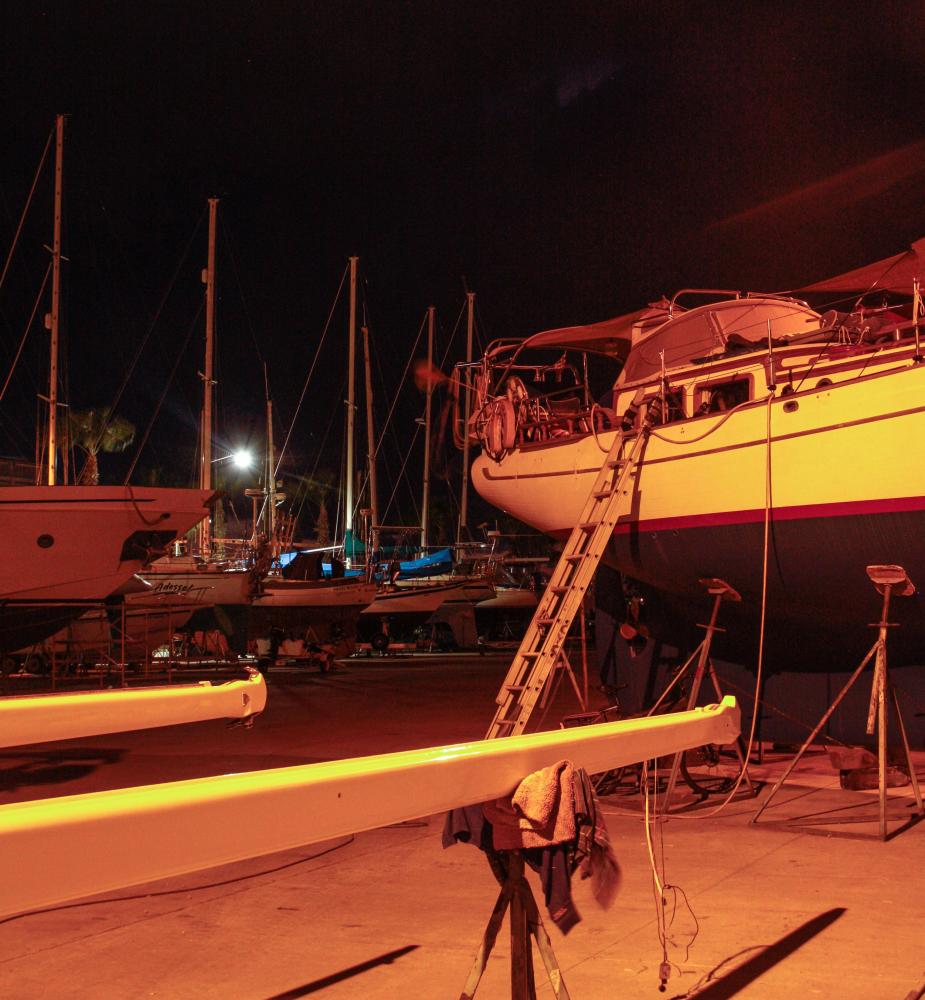 I just came out of a long yard period, almost two months on the hard. That was a long time in such an environment. Place Mabrouka high and dry on a concrete slab the size of a football field, with tumbleweeds of used blue masking tape and shredded polyethylene wrap collecting around her paint-splattered support stands, then add heat averaging around 90 degrees with enough humidity to make your bones soggy and you'll imagine only the half of it. There were desert-like drifts of sand that piled up around any obstruction that would disrupt the wind, except it was made up of the toxic detritus of bottom paint, gel coat, and fiberglass that had been ground off Mabrouka's hull and those of her neighbors. Mabrouka was only one in a restless herd of boats being tended there, shuffled about by boatyard cow pokes driving a big yellow tractor and their huge 50 ton boat lift, coaxing sail and power yachts of Mabrouka's size, smaller and much bigger, in and out of stalls that lined the perimeter of the yard. Small sport and fishing boats gamboled around the bigger crafts' keels on trailers like calves hoping to suckle a quick meal.
I just came out of a long yard period, almost two months on the hard. That was a long time in such an environment. Place Mabrouka high and dry on a concrete slab the size of a football field, with tumbleweeds of used blue masking tape and shredded polyethylene wrap collecting around her paint-splattered support stands, then add heat averaging around 90 degrees with enough humidity to make your bones soggy and you'll imagine only the half of it. There were desert-like drifts of sand that piled up around any obstruction that would disrupt the wind, except it was made up of the toxic detritus of bottom paint, gel coat, and fiberglass that had been ground off Mabrouka's hull and those of her neighbors. Mabrouka was only one in a restless herd of boats being tended there, shuffled about by boatyard cow pokes driving a big yellow tractor and their huge 50 ton boat lift, coaxing sail and power yachts of Mabrouka's size, smaller and much bigger, in and out of stalls that lined the perimeter of the yard. Small sport and fishing boats gamboled around the bigger crafts' keels on trailers like calves hoping to suckle a quick meal.Mornings typically started with a coffee drip-brewed through my one-cup Melitta filter, then doctored with a teaspoon of unbleached sugar and a slosh of milk. If I'd overslept or just lazed too long in my bunk, the start of the day would be announced by the heavy rattle of the industrial door rolling up around it's spindle above the Mazatlan Marine Services' shop entrance. I was usually up by six-thirty, though, slouched in my camp chair on the flat deck of Mabrouka's cockpit sipping my Joe and prowling through the morning's Facebook posts in time to witness Rick, Mazatlan Marine's owner and manager, glide up in his golf cart to his shop at seven to open it for the crew. He got used my addition to his routine, too, usually tossing a look up over his shoulder and calling out a friendly, "Buay-nos dee-aahz" as he rolled by below.
If I hadn't actually been awakened by them first thing in the morning, potential plans for the day would usually have filtered into my mind between dreams during the night. I tried to keep them submerged long enough for Rick to at least have lit another in his already long line of morning cigarettes, but it was never much more than five minutes before I'd climb down my ladder and amble up to discuss the day with him. He was unfailingly amiable and often over-optimistic about what would get done toward completing the list of jobs that had grown since before Mabrouka had come into the yard in mid-June.
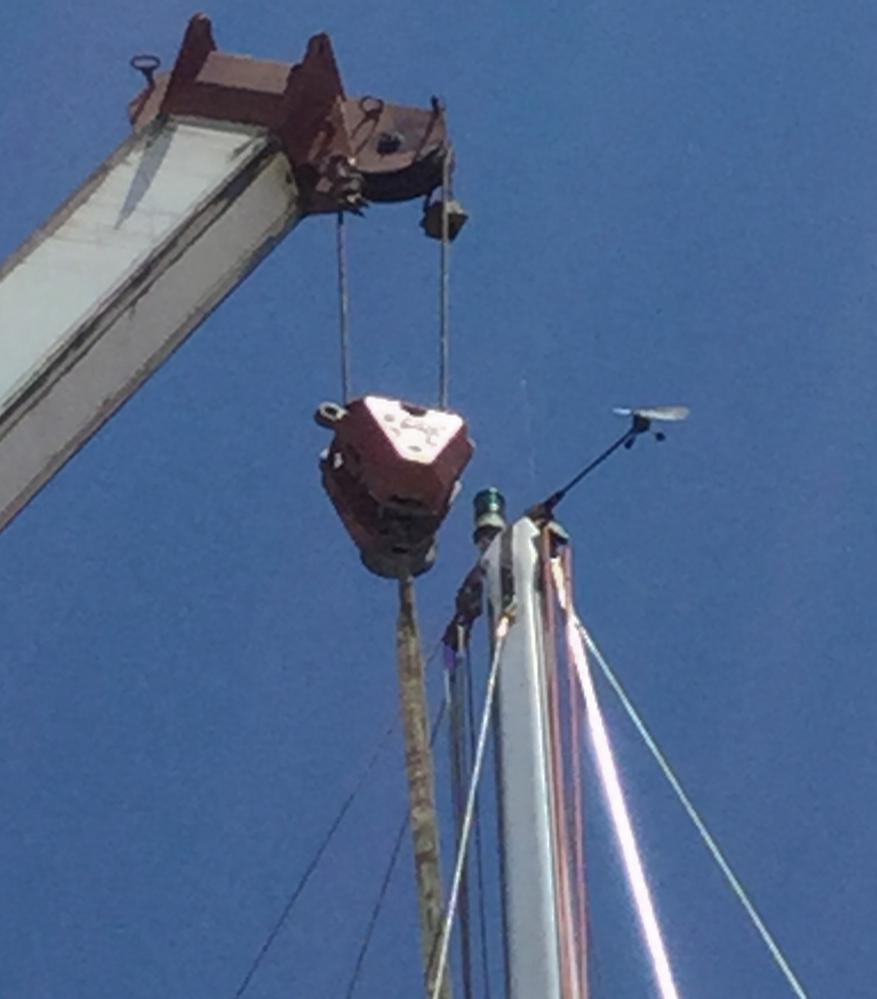 The big task I'd built this yard period around was to pull Mabrouka's masts to inspect, repair, and paint them. While the masts were out, we'd also planned to inspect the chain plates, repairing and/or replacing them as required. Ultimately they were all replaced. The masts required only minor cosmetic repairs and all the hardware was cleaned, inspected and polished, replacing clevis pins wherever they were the least bit suspect. Having the rig down at ground level provided an excellent opportunity to install some new LED lights I'd bought the last time I was up States-side: an anchor/tri-color/flasher atop the main and a pair of spreader lights for each mast. A loudspeaker for the VHF radio's PA function was also installed on the mizzen so now I can yell at people and take advantage of its automatic fog horn.
The big task I'd built this yard period around was to pull Mabrouka's masts to inspect, repair, and paint them. While the masts were out, we'd also planned to inspect the chain plates, repairing and/or replacing them as required. Ultimately they were all replaced. The masts required only minor cosmetic repairs and all the hardware was cleaned, inspected and polished, replacing clevis pins wherever they were the least bit suspect. Having the rig down at ground level provided an excellent opportunity to install some new LED lights I'd bought the last time I was up States-side: an anchor/tri-color/flasher atop the main and a pair of spreader lights for each mast. A loudspeaker for the VHF radio's PA function was also installed on the mizzen so now I can yell at people and take advantage of its automatic fog horn.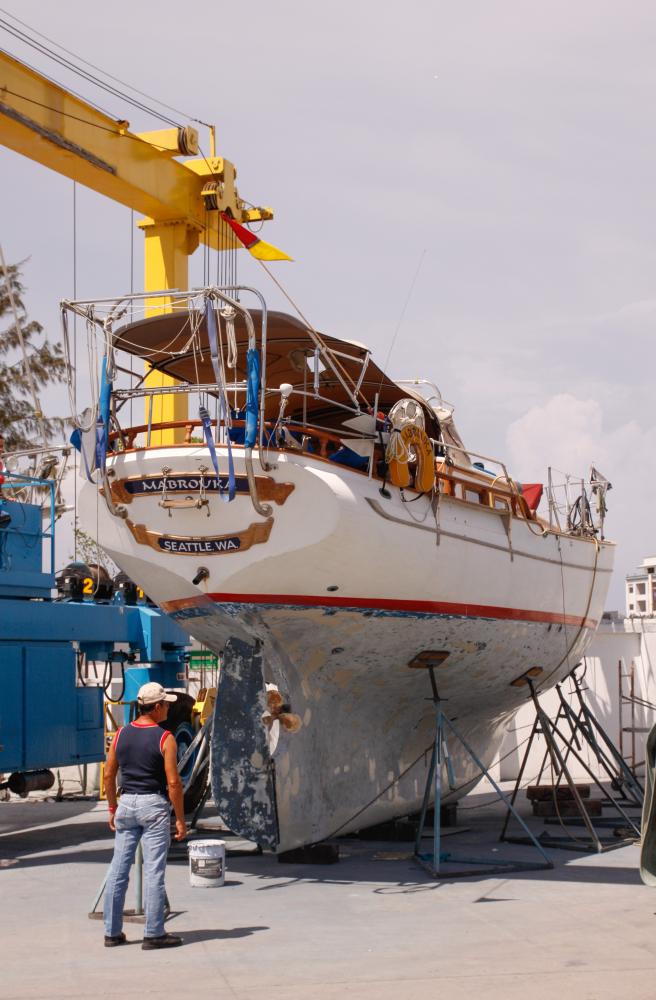 Of course, it's kind of pointless to haul a boat out of the water and not do bottom paint, but what was intended to be a plain vanilla job grew serendipitously into stripping the hull down to the gel coat, then grinding out and resealing osmosis blisters. Mabrouka has had blisters in her gel coat since before I bought her, but they were a smattering of dime-sized blemishes that have remained stable for fifteen years so I had not intended on doing anything about them. The yard labor had different ideas, though and, in a spate of unsupervised zealotry, got carried away with their grinders and left divots all over the hull wherever there'd been a blister. Since I hadn't commissioned the work, the yard was obligated to fill the holes and apply new barrier coat before doing the bottom paint. I let them do it, ...for free. From there it was straight forward add-on work to include a professional respray of the red boot stripe I'd masked off and hand painted when Mabrouka was in the yard two springs ago.
Of course, it's kind of pointless to haul a boat out of the water and not do bottom paint, but what was intended to be a plain vanilla job grew serendipitously into stripping the hull down to the gel coat, then grinding out and resealing osmosis blisters. Mabrouka has had blisters in her gel coat since before I bought her, but they were a smattering of dime-sized blemishes that have remained stable for fifteen years so I had not intended on doing anything about them. The yard labor had different ideas, though and, in a spate of unsupervised zealotry, got carried away with their grinders and left divots all over the hull wherever there'd been a blister. Since I hadn't commissioned the work, the yard was obligated to fill the holes and apply new barrier coat before doing the bottom paint. I let them do it, ...for free. From there it was straight forward add-on work to include a professional respray of the red boot stripe I'd masked off and hand painted when Mabrouka was in the yard two springs ago.Rick's operation is one of at least four in the facility that, between them, kept things buzzing for the duration of my mid-June through mid-September stay. Although I dove into quite a bit of the work done on Mabrouka myself, enduring the drifting clouds of fiberglass dust and soaking through stacks of tee shirts with my own well-earned sweat, I would often invoke the privilege that goes along with my retired, cruiser's status and enjoy a cool drink in the shade while others worked away in the hot sun. Taking such opportunity as I desired to observe the yard from my camp chair in Mabrouka's cockpit, I could sit fifteen feet above the fray watching and listening to the sounds below, safe in the relatively dust free atmosphere above the caustic cloud of overspray and sanding dust that was swirled among the keels and hulls in tidal ebbs and flows by the hot breath of the summer wind. An inescapable hubbub was built from the high-throated whir of air-powered grinders, the motorized chuffing of sanders pitting their 80-grit strength inexorably against doomed paint and fiberglass, the rapping of a three pound hammer knocking some sense into a cold chisel in an effort to convince an obstinate cutlass bearing to relinquish its grip on its bronze shaft strut.
Involvement with my own projects taught me several practical things: The use and application of epoxy filler, "pasta" in the boat yard's vernacular. Except that it's green and not molten hot, that stuff is like gooey lava that hardens into plastic granite to fill unwanted holes. Discovery of a couple of patches of dry rot provided the opportunity to use Smith's Clear Penetrating Epoxy Sealer, which soaks into rotted wood to harden it for another incarnation as a structural component. I'd never much used anti-seize compound to put bolts together before, but once you've had a stainless steel nut seize itself onto a stainless steel bolt, you'll never forget to use it again. Did you know that, if your tap breaks off in a hole you're trying to thread, give it a sharp wrap with a hammer and a punch to shatter the obnoxious little remnant out of the hole? Forget trying to drill it out, the metal is too hard for that.
Those were all easy and, to the craftsman in me, fun learning experiences. The harder lesson was about my need to manage the work mo' bettah. Rick is an unbelievably deep resource in boat maintenance and repair of every sort. It may be that I detected him bullshitting his way through a topic or two, but even then his spiel was so eloquent and confidence inspiring that I wouldn't have dared call him on it. His expertise is also his downfall, though, because it requires him to be too many places at once. I'm sure that's what caused him to miss that his labor was getting carried away grinding Mabrouka's hull. I think it also tends to make him hurry through his own tasks with a little less thought than might be necessary. He never hesitated to make the work right, though and I didn't detect any bill-padding that might have attempted to make up for the extra expense. If pressed I could point out a few incongruities in the finished product that are due to retrograde modifications, but none of them will jump out at the casual observer.
Rick seems to have decided that it's usually not worth arguing with his customers. Wikipedia hesitates to attribute the slogan, "The customer is alway right" to any particular entrepreneur, but successful department store retailers like Marshall Field used that or similar phrases. Field was directly quoted as telling his employees to "Give the lady what she wants."
There was one time that Rick gave me what I wanted and I wish he hadn't. Before I owned Mabrouka, her masts had been sprayed with linear polyurethane paint. That was over sixteen years ago and they only recently started to show deterioration up top above my ability to easily mitigate the effects of burning sun. Now THAT's a good paint job. I'd originally thought I'd repaint the masts myself, so I'd gone to some trouble imposing on a friend to import several quarts of regular Interlux polyurethane paint. Even though I'd later decided to have the yard do the painting, I stipulated that they use my paint. Now, seeing how sensitive the Interlux was even to the slight abrasive abuse it suffered while being handled in the yard, I wish that an argument had at least be presented in favor of the more rugged two-part epoxy paint that, as Rick later admitted, he would otherwise have recommended.
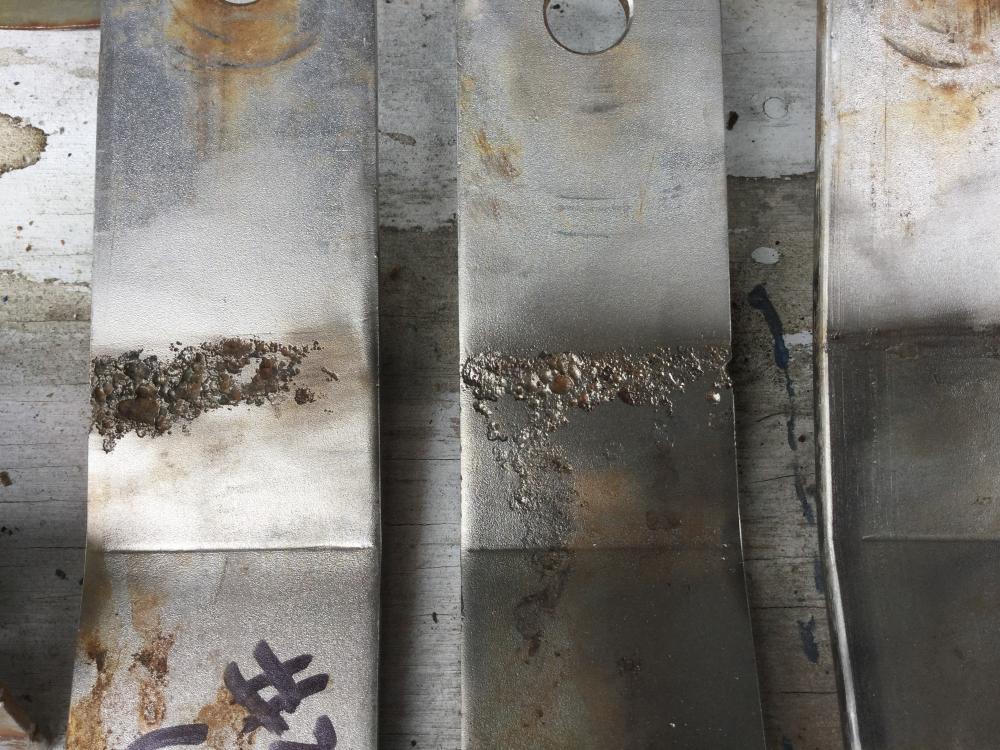 The inspection of Mabrouka's chainplates resulted in replacing all of them. I could have kept a few of the originals, but with all the work invested in pulling them out for inspection in the first place, that would have been silly. Maybe the idea of chainplates needs to be explained. The masts are held up by stainless steel cables, called shrouds (port and starboard) and stays (fore and aft), that secure by various means at their upper ends to the masts and by chainplates at their lower ends through the deck to the hull.
The inspection of Mabrouka's chainplates resulted in replacing all of them. I could have kept a few of the originals, but with all the work invested in pulling them out for inspection in the first place, that would have been silly. Maybe the idea of chainplates needs to be explained. The masts are held up by stainless steel cables, called shrouds (port and starboard) and stays (fore and aft), that secure by various means at their upper ends to the masts and by chainplates at their lower ends through the deck to the hull.In Mabrouka's case, these are quarter-inch thick by two-inch wide by however long stainless steel straps that are bolted in. Instead of actually bolting them into the hull, the Tai Chiao yard bolted the chainplates to some heavy teak boards, then fiberglassed the boards into the inside of the hull. Then, of course, they proceeded to build in all Mabrouka's cabinetry to make chainplate inspection even more of a thrill. If you can picture this arrangement, you'll note that it captured the heads of the bolts between the hull and the boards so that, once the nuts on the inboard sides were undone to remove the chainplates, we couldn't get to the heads of the bolts. You can imagine that, after 35 years of sailing around, some of the nuts refused to come off because the bolts just turned along with them. Those recalcitrants had to be cut off, thus eliminating our ability to reuse any of the bolts for that chainplate.
Our solution was to put new bolts in slightly offset from the old, but to go all the way through the hull. To distribute the load on the fiberglass, we added backing plates on the outside of the hull. Okay, so new bolts had to be arranged, but we couldn't find what we needed in Mexico and had to order them from the US. That took a week or two, so when some of the bolts ordered were in the wrong quantity, had the wrong diameter or the wrong length or didn't have enough thread, we ran into roadblocks and delays. I'm sure he wouldn't have minded and I think I could have saved Rick some money and both of us some heartache if I'd exercised a bit more of my owner's prerogative to officiate over the specification of replacement bolts.
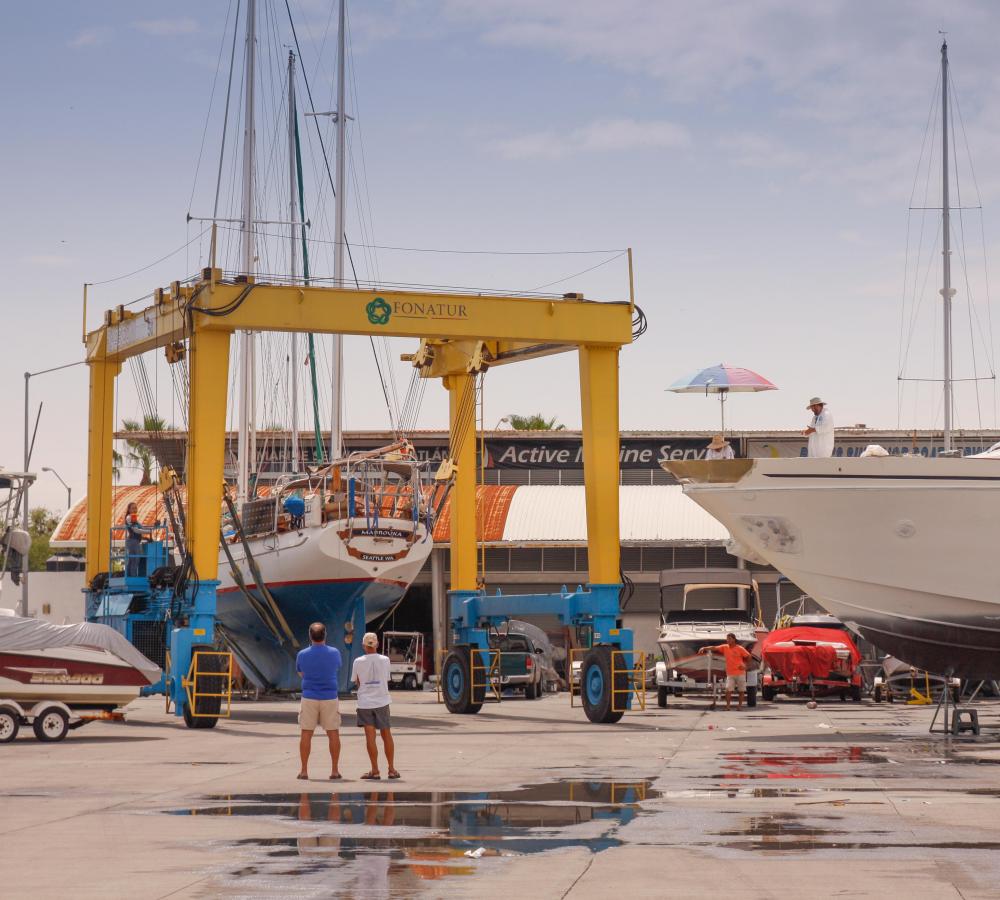 In the end I'm pretty happy with the results of this haul out. There are a few places where, if I were to dwell on it, I could get grumpy about details of execution, but I think that we've eliminated a significant source of potential disaster with the work the yard did and I will sail off over the horizon with much greater confidence in the trustworthiness of Mabrouka's rig in the face of a storm at sea.
In the end I'm pretty happy with the results of this haul out. There are a few places where, if I were to dwell on it, I could get grumpy about details of execution, but I think that we've eliminated a significant source of potential disaster with the work the yard did and I will sail off over the horizon with much greater confidence in the trustworthiness of Mabrouka's rig in the face of a storm at sea.The yard personnel were all gems. Here's a quick gallery:
Sergio (left) and Rick (right) working on the new mizzen step:
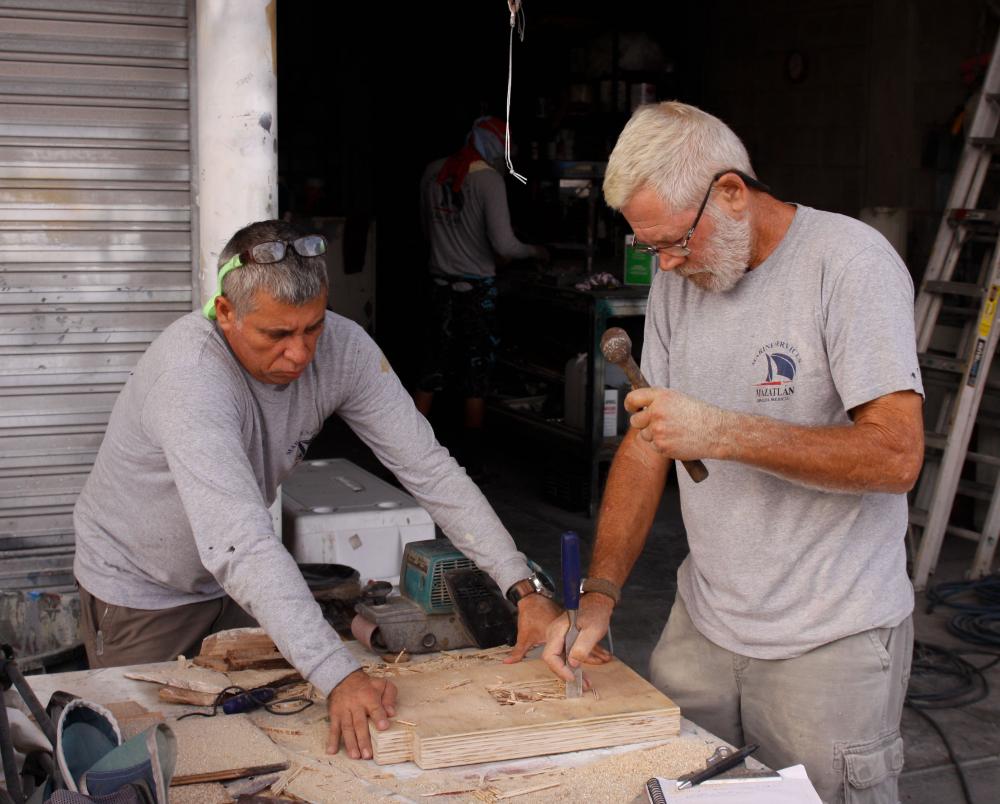
Sergio already got his picture posted above, but I liked this one so much I put it in here, too:
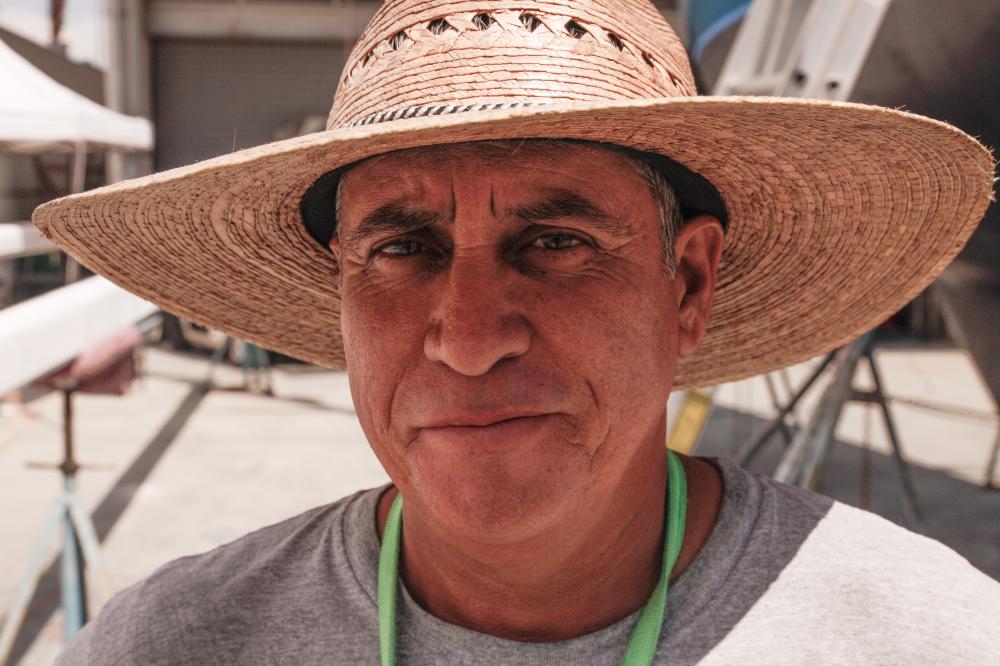
Gustavo in his Donatello (Mutant Ninja Turtle) disguise:
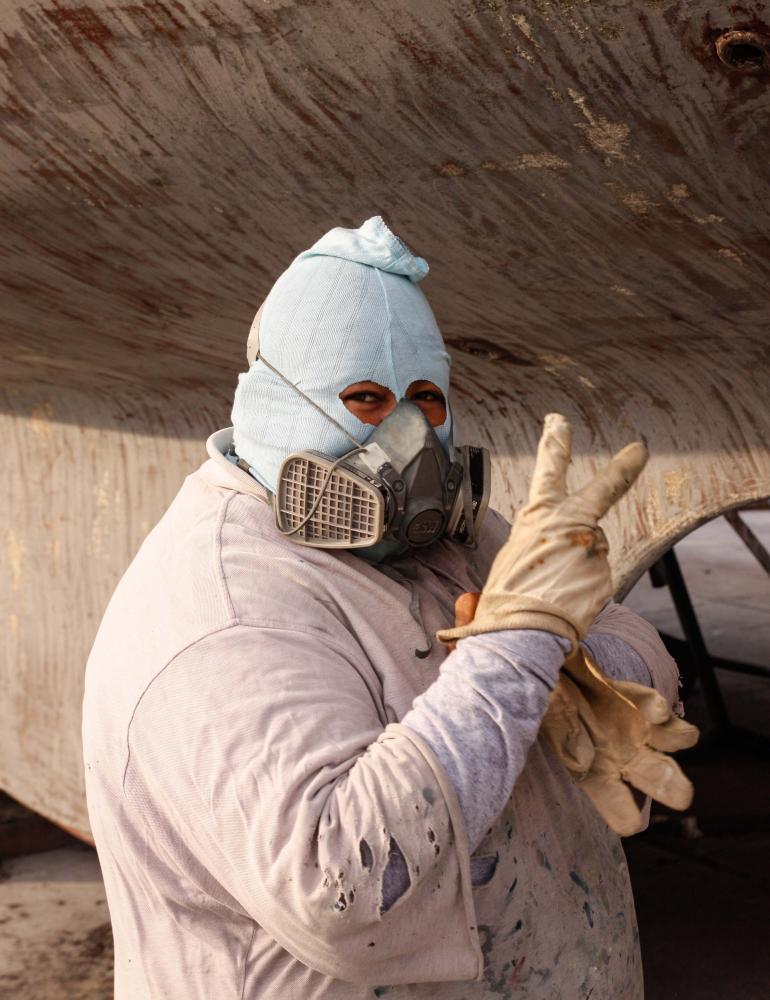
Richy in HIS Mutant Ninja Turtle disguise (painting outfit), but he doesn't fill the role as well as Gustavo does:
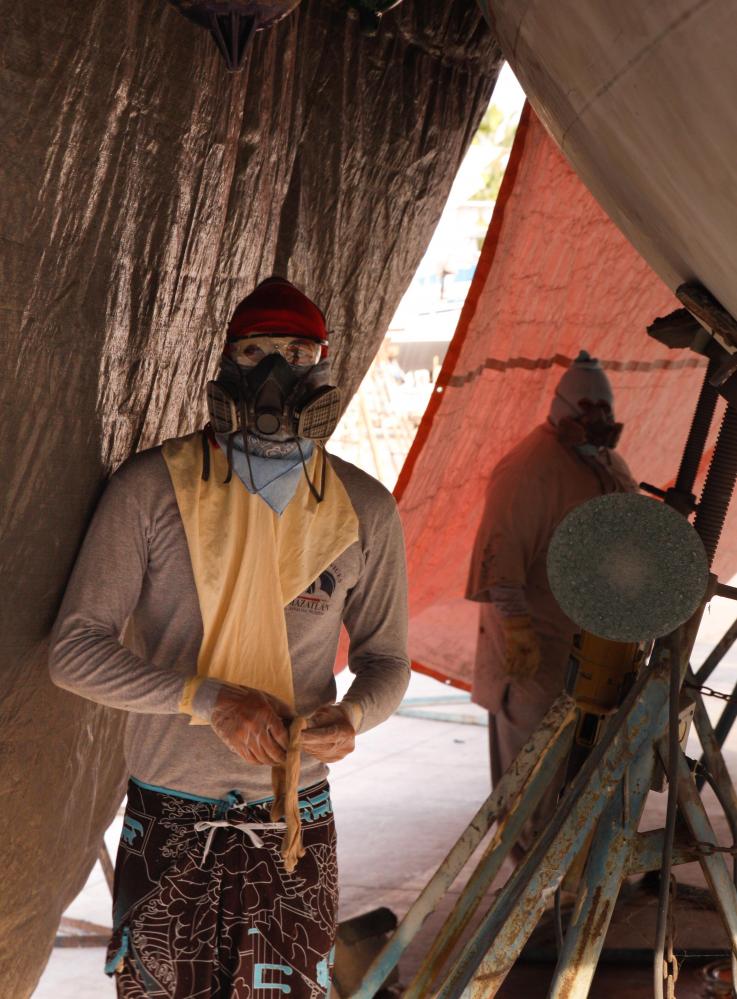
There were several other workers, but they seemed to be floaters (Miguel and Manual) or only showed up in the last week or so (Edi and Ignacio), so I didn't get pictures of them. Sorry guys.
Chacala Approach
21 August 2015
Roy / Sunny, hot and humid
[This event dates back to the first half of March, but the summer lightning and thunder storms here in Mazatlan brought the imagery to mind and I share it with you now, however late.]
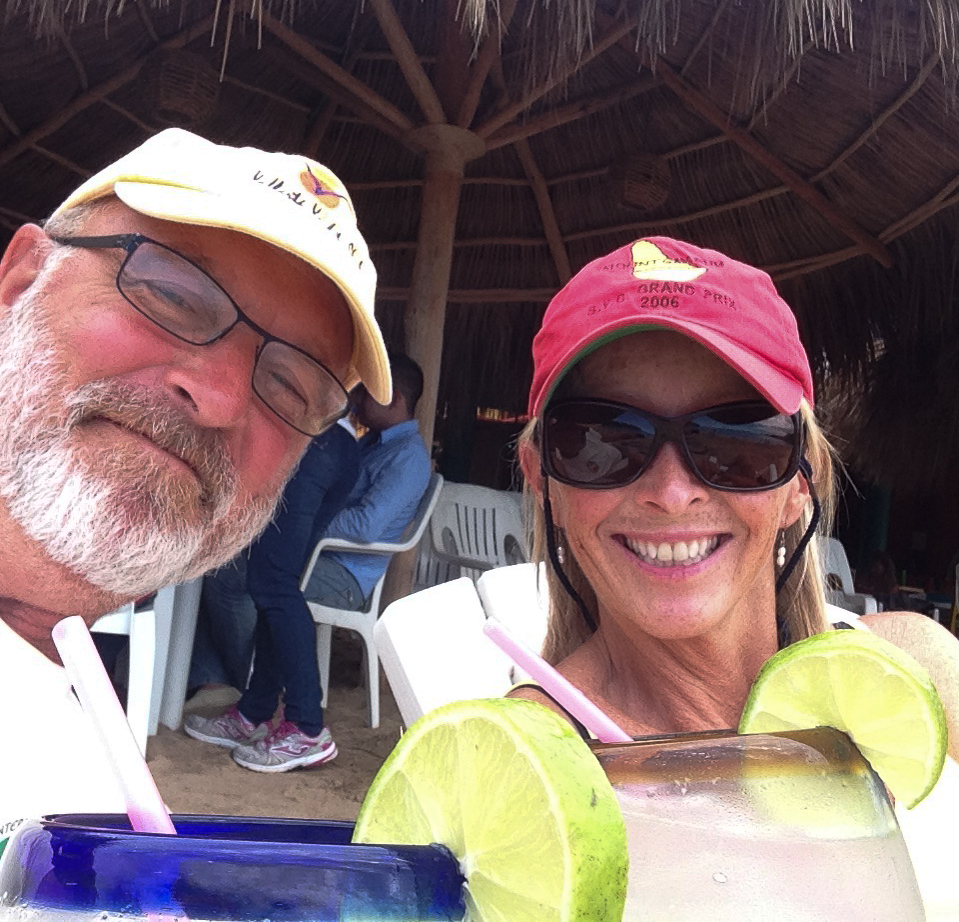 The sound of crumbling granite bellowed from the skies, tearing a ragged hole in the windless afternoon. It growled, grinding and rumbling, as it tumbled down the hills and rolled out of the lush tropical valleys that build this rugged stretch of mainland Mexico's west coast. The flash of lighting that had heralded it had been cloaked by an escarpment of rain that was closing in on Mabrouka as we motor-sailed her northward along the dark, jagged shore we knew was hidden a half-mile to our starboard. Heather and I searched for physical references that could affirm the position given by our chart plotter. The encroaching downpour was quickly cutting our visibility and actual locations from electronic charts are notoriously inaccurate in this part of the world, so the tension between us cried out for reliable guidance toward a safe haven. Where exactly did that pinnacle of rock stand? We feared it as a threat, but contrarily sought it out as a guidepost to Chacala Bay whose shelter was teasing us with symbolic security somewhere less than a mile off the starboard bow?
The sound of crumbling granite bellowed from the skies, tearing a ragged hole in the windless afternoon. It growled, grinding and rumbling, as it tumbled down the hills and rolled out of the lush tropical valleys that build this rugged stretch of mainland Mexico's west coast. The flash of lighting that had heralded it had been cloaked by an escarpment of rain that was closing in on Mabrouka as we motor-sailed her northward along the dark, jagged shore we knew was hidden a half-mile to our starboard. Heather and I searched for physical references that could affirm the position given by our chart plotter. The encroaching downpour was quickly cutting our visibility and actual locations from electronic charts are notoriously inaccurate in this part of the world, so the tension between us cried out for reliable guidance toward a safe haven. Where exactly did that pinnacle of rock stand? We feared it as a threat, but contrarily sought it out as a guidepost to Chacala Bay whose shelter was teasing us with symbolic security somewhere less than a mile off the starboard bow?
Security, in this instance, was indeed only symbolic. Who can hide from a lightning strike? Wind, rain, and heavy seas can be dealt with in measures by preparation, sail configuration, strategies of avoidance and, if all else fails, sheer determination, but the instant calamity of a thunderbolt to the mast offers so sudden and unpredictable a threat that only theoretical arrangements of cables and plates can even make a joke of safety. Heather had been diligent in putting the handheld GPS, laptops, cell phones, and portable VHF radio in the microwave and the main and mizzen sails would soon be dowsed and secured. All that could then be done was to seek the slight comfort offered in the bosom of the nearby bay and the semi-surety of our anchor's firm grip in that sandy bottom.
My confidence in our approach was firm, but not unshakable. I'd been here before and could not recall any particular dangers lurking beneath the surface as we headed in toward shore, ...that is, except the shore itself. That was the problem. The rain, now in competition with Niagara Falls, had eliminated all visual and auditory input except the pounding of my heart in my ears. I was forced to rely on the boat's electronic senses, the iffy location vouched for by the chart plotter, and the water depth continually displayed on the sounder. They told me nothing of other boats that might already be sheltering in the bay. Mabrouka doesn't have radar.
Fifty, forty, thirty feet of water with visibility about the same, except in reverse order. When I'd anchored here before it had been in a depth of twenty feet or so and well outside the surf line. Graciously, the weather gods relented enough to give me my bearings. The face of the bay still reflected the ash-grey color of the sky and its skin was given a mottled teenage texture by the heavy rain drops, but I could see that the waves tumbling ashore were a hundred yards away and only a few other boats were swinging on their anchor lines nearby. Plenty of room to drop the hook for the night. Ahh.
[Heather had sailed northward with me out of La Cruz. We'd originally become acquainted by email not long before I'd headed out of Seattle on the Coho Ho Ho, swapping sailing resumes with the prospect of her joining up as San Diego-bound crew, but life got in the way. Then we happened upon each other during the Banderas Bay Regatta and, after getting acquainted in person, she agreed to help me sail Mabrouka back up to Mazatlan. Heather is a licensed captain and comes with an impressive sailing resume not to mention an attractive appearance and a pleasant personality. I hope to have her come aboard Mabrouka for more cruising in the future.]
 The sound of crumbling granite bellowed from the skies, tearing a ragged hole in the windless afternoon. It growled, grinding and rumbling, as it tumbled down the hills and rolled out of the lush tropical valleys that build this rugged stretch of mainland Mexico's west coast. The flash of lighting that had heralded it had been cloaked by an escarpment of rain that was closing in on Mabrouka as we motor-sailed her northward along the dark, jagged shore we knew was hidden a half-mile to our starboard. Heather and I searched for physical references that could affirm the position given by our chart plotter. The encroaching downpour was quickly cutting our visibility and actual locations from electronic charts are notoriously inaccurate in this part of the world, so the tension between us cried out for reliable guidance toward a safe haven. Where exactly did that pinnacle of rock stand? We feared it as a threat, but contrarily sought it out as a guidepost to Chacala Bay whose shelter was teasing us with symbolic security somewhere less than a mile off the starboard bow?
The sound of crumbling granite bellowed from the skies, tearing a ragged hole in the windless afternoon. It growled, grinding and rumbling, as it tumbled down the hills and rolled out of the lush tropical valleys that build this rugged stretch of mainland Mexico's west coast. The flash of lighting that had heralded it had been cloaked by an escarpment of rain that was closing in on Mabrouka as we motor-sailed her northward along the dark, jagged shore we knew was hidden a half-mile to our starboard. Heather and I searched for physical references that could affirm the position given by our chart plotter. The encroaching downpour was quickly cutting our visibility and actual locations from electronic charts are notoriously inaccurate in this part of the world, so the tension between us cried out for reliable guidance toward a safe haven. Where exactly did that pinnacle of rock stand? We feared it as a threat, but contrarily sought it out as a guidepost to Chacala Bay whose shelter was teasing us with symbolic security somewhere less than a mile off the starboard bow?Security, in this instance, was indeed only symbolic. Who can hide from a lightning strike? Wind, rain, and heavy seas can be dealt with in measures by preparation, sail configuration, strategies of avoidance and, if all else fails, sheer determination, but the instant calamity of a thunderbolt to the mast offers so sudden and unpredictable a threat that only theoretical arrangements of cables and plates can even make a joke of safety. Heather had been diligent in putting the handheld GPS, laptops, cell phones, and portable VHF radio in the microwave and the main and mizzen sails would soon be dowsed and secured. All that could then be done was to seek the slight comfort offered in the bosom of the nearby bay and the semi-surety of our anchor's firm grip in that sandy bottom.
My confidence in our approach was firm, but not unshakable. I'd been here before and could not recall any particular dangers lurking beneath the surface as we headed in toward shore, ...that is, except the shore itself. That was the problem. The rain, now in competition with Niagara Falls, had eliminated all visual and auditory input except the pounding of my heart in my ears. I was forced to rely on the boat's electronic senses, the iffy location vouched for by the chart plotter, and the water depth continually displayed on the sounder. They told me nothing of other boats that might already be sheltering in the bay. Mabrouka doesn't have radar.
Fifty, forty, thirty feet of water with visibility about the same, except in reverse order. When I'd anchored here before it had been in a depth of twenty feet or so and well outside the surf line. Graciously, the weather gods relented enough to give me my bearings. The face of the bay still reflected the ash-grey color of the sky and its skin was given a mottled teenage texture by the heavy rain drops, but I could see that the waves tumbling ashore were a hundred yards away and only a few other boats were swinging on their anchor lines nearby. Plenty of room to drop the hook for the night. Ahh.
[Heather had sailed northward with me out of La Cruz. We'd originally become acquainted by email not long before I'd headed out of Seattle on the Coho Ho Ho, swapping sailing resumes with the prospect of her joining up as San Diego-bound crew, but life got in the way. Then we happened upon each other during the Banderas Bay Regatta and, after getting acquainted in person, she agreed to help me sail Mabrouka back up to Mazatlan. Heather is a licensed captain and comes with an impressive sailing resume not to mention an attractive appearance and a pleasant personality. I hope to have her come aboard Mabrouka for more cruising in the future.]
Autopilot woes devolve to ancient history
21 August 2015
Roy / Sunny, hot and humid
[This entry has been sitting in queue for quite a long time. I almost hate to post it because it's (for one) such a lonnnnnnnng (and two), saaaaaad story that it makes it seem like I'm a complainer. Autopilots are critical and sensitive beings, though, so it may be a morality tale for those interested in how human foibles can foul the technical workings of important sailboat systems. Those of you who'd rather read about sandy beaches and tall, cold, tropical drinks can just pass this one by.]
 Groping back to my February thirteenth edition of this blog (Yes, that was INDEED a Friday!), I related that I'd made an abortive first southward attempt from Mazatlan on January 7th, only to return to the slip that would become my longtime residence to work with the obstreperous autopilot. Back dock-bound, I poked and prodded at the system, spending seemingly countless hours bleeding hydraulics, following the manufacturer's prescribed trouble-shooting procedures, and generally moping about how star-crossed my life had become in every aspect. I cajoled Will Hamm (the founder and owner of W-H Autopilots) into sending me a replacement for the suspect RAT (rudder angle transmitter) with it's wonky sensor arm shaft that wobbled slightly in its socket. That replaced and with instructions for electronic tweaking, two volunteer deck hands, and hopes of an air bubble-less hydraulic system aboard, I took Mabrouka outside the harbor for a sea trial.
Groping back to my February thirteenth edition of this blog (Yes, that was INDEED a Friday!), I related that I'd made an abortive first southward attempt from Mazatlan on January 7th, only to return to the slip that would become my longtime residence to work with the obstreperous autopilot. Back dock-bound, I poked and prodded at the system, spending seemingly countless hours bleeding hydraulics, following the manufacturer's prescribed trouble-shooting procedures, and generally moping about how star-crossed my life had become in every aspect. I cajoled Will Hamm (the founder and owner of W-H Autopilots) into sending me a replacement for the suspect RAT (rudder angle transmitter) with it's wonky sensor arm shaft that wobbled slightly in its socket. That replaced and with instructions for electronic tweaking, two volunteer deck hands, and hopes of an air bubble-less hydraulic system aboard, I took Mabrouka outside the harbor for a sea trial.
Miracle of miracles, half an hour and a quarter turn of a little, green-painted potentiometer later, the autopilot seemed to be working perfectly. Although I didn't understand how an arbitrary twist of a little screw could be lucky enough to do the trick, I decided not to question this quirk of fate and gloried, instead, in the system's prompt and precise execution of the commands we issued. We spent another ecstatic half-hour turning dials and bumping toggles on the control unit's face, driving Mabrouka around the ocean in an expansive, geometric course.
With this and other previously described accomplishments under Mabrouka's belt, I once again exited Marina Mazatlan, made my way out the channel past the upscale docks, expansive swimming pools (yes, with that trailing "s"), and faux adobe towers of El Cid Marina and Resort, ventured past the break waters and around Mazatlan's outlying islands toward a restful, pre-passage day anchored in the quiet bay just south of the commercial harbor. Mona Laguna (recall the autopilot's nickname) performed flawlessly, moaning in ecstasy as she coaxed the helm port and starboard toward Stone Island. HUZZAH!
She continued her faithful service throughout the ninety-some-odd nautical mile solo passage overnight to Isla Isabel, but couldn't maintain her constancy all the way from Isabel to Chacala, attempting instead to execute a gracefully twirling course about ten miles from our destination. This prompted more dishearteningly pointless adjustment attempts on my part, including many not so graceful twirls of the previously cooperative green potentiometer, interspersed with much appropriately salty (i.e. INappropriate) language.
Temporarily giving up on resurrection efforts, I hand-steered the rest of the way to Chacala, then down the coast around Punta de Mita and into Banderas Bay. La Cruz saw a couple more telephone conferences with Will Ham followed by expeditions on the bay to calibrate the flux gate compass, all to no avail.
Luckily, I happened upon a previous on-line acquaintance in Heather Sloat, an experienced and attractive sailor, who kindly agreed to sail with me back up to Mazatlan. Heather's help made for confident, non-autopilot sailing of overnight passages northward, and we got Mabrouka safely back to Mazatlan in time for my two week States-side holiday from cruising to attend a family reunion in Sedona, Arizona.
Before departing for the States, I'd invested in substantial email conversation with Will, the result of which was mostly consternation on his part. He'd NEVER had this sort of problem with ANY of the zillions of systems he'd sold, he insisted. It was a total mystery. It was a mystery to me, too. I'd bought the system on strong recommendations of its reliability, so the mystery was to remain wrapped in tattered rags of disappointment like a mummy for a little while longer.
Working on the assumption that my purchase had not been ill advised, my next suspect in this malperformance was my installation. As you might recall from the woe-fraught blog posts on this subject at the beginning of this cruise, I'd fabricated the hydraulic portion of the system myself, using Will's system components, but making the hydraulic connections with copper tubing and brass fittings purchased at the local Ace hardware store and assembled by my own hands using my amateur tools. That turned out to be the cause of initial problems with the system, again invoking hours and hours of attempts to bleed air out of the system. My inadequate connections apparently made success impossible in that regard and the system was condemned by a professional in Anacortes just days before departure. He was paid to redo my shoddy workmanship, but even so we were never really sure we'd rid the system of air pockets.
This reversion to ancient history is a prelude to the fact that I, once again, had the hydraulics rebuilt. Although the Anacortes technician had applied all his professional skills and used professional tools to hook it all up, we'd never seemed to succeed in bleeding all the air out, so I hired Mazatlan Marine Services to rebuild it again while I was up in the States, this time with hydraulic hoses and an additional bleed port.
Testing the system upon my return to Mexico, the hydraulic action proved itself to be much more solid and responsive. Gone was the springiness I'd felt in the system and the wheel responded almost immediately to control signals. Sea trials, however, still showed it to prefer circles over straight lines when actually asked to steer. More emails later, I found myself with a new series of troubleshooting tests and adjustment procedures, a confused manufacturer, and a disgruntled skipper.
No matter, doggone it! I wanted to go cruise The Baja, so, still autopilot-less, my return to Mexico commenced almost immediately with a crossing of the Sea of Cortez/Bay of California to enjoy the scenic and aquatic pleasures of the bays and islands of Baja. The 190 mile crossing was made in a controlled manner with the help of newly recruited crew, Tina, and old friend, Kevin, but my adventures northward from La Paz were made in single-handed, self-steering fashion from caleta to ensenada to bahia by day trips that involved neither darkness nor exhaustingly lengthy passages.
That is, until I finally took the time to enact that last set of adjustment and trouble-shooting instructions I'd received from Will before departing Mazatlan. That occurred, if I recall correctly, in Honeymoon Cove on Danzante Island. It was an otherwise normal, though typically idyllic day, but I felt uncharacteristically productive and decided to pretend that I knew what I was doing. Lo and behold, Will's test instructions led me to notice a clue that betrayed the true malady with the autopilot, ...my stupidity. Well, if not stupidity, at least lack of observational skills.
Per instruction, I was to press the buttons that turned the wheel port and starboard and adjust a different potentiometer (this time, yellow) that limited the autopilot's "throw" to within the mechanical stops of the quadrant. Somewhere in this process, I just happened to notice that pushing the starboard button was turning the wheel to port and hitting the port button behaved in vice-versa manner.
Recalling my initial installation of the system, I knew that the simple reversal of two wires would correct this ill effect and I easily accomplished said correction. I might have flattened my forehead with all the blows self-administered by the heel of my hand, but my astonishment turned to elation before that happened and I went out to, at long, long, last, finally conduct a successful sea trial on my autopilot.
It would be easy to blame Mabrouka's long hiatus from self-steering on Will Ham for not asking the pointedly correct question from the outset, or on Mazatlan Marine Services for disconnecting and improperly reconnecting the autopilot motor. However, the fault is, at it's core, mine for not initially hooking up the power wires with consistent color coding that would not have led the hydraulics mechanic astray. In the end, I'm glad that the error was a simple one that, once discovered, was simple to correct. I'm only abashed at how long it took for me to discover it. I have been enjoying confidence in Will's system ever since and owe him many apologies for questioning his design and advice.
Append whatever phrases of thanks and praises you'd like at this point. I'm going cruising.
 Groping back to my February thirteenth edition of this blog (Yes, that was INDEED a Friday!), I related that I'd made an abortive first southward attempt from Mazatlan on January 7th, only to return to the slip that would become my longtime residence to work with the obstreperous autopilot. Back dock-bound, I poked and prodded at the system, spending seemingly countless hours bleeding hydraulics, following the manufacturer's prescribed trouble-shooting procedures, and generally moping about how star-crossed my life had become in every aspect. I cajoled Will Hamm (the founder and owner of W-H Autopilots) into sending me a replacement for the suspect RAT (rudder angle transmitter) with it's wonky sensor arm shaft that wobbled slightly in its socket. That replaced and with instructions for electronic tweaking, two volunteer deck hands, and hopes of an air bubble-less hydraulic system aboard, I took Mabrouka outside the harbor for a sea trial.
Groping back to my February thirteenth edition of this blog (Yes, that was INDEED a Friday!), I related that I'd made an abortive first southward attempt from Mazatlan on January 7th, only to return to the slip that would become my longtime residence to work with the obstreperous autopilot. Back dock-bound, I poked and prodded at the system, spending seemingly countless hours bleeding hydraulics, following the manufacturer's prescribed trouble-shooting procedures, and generally moping about how star-crossed my life had become in every aspect. I cajoled Will Hamm (the founder and owner of W-H Autopilots) into sending me a replacement for the suspect RAT (rudder angle transmitter) with it's wonky sensor arm shaft that wobbled slightly in its socket. That replaced and with instructions for electronic tweaking, two volunteer deck hands, and hopes of an air bubble-less hydraulic system aboard, I took Mabrouka outside the harbor for a sea trial.Miracle of miracles, half an hour and a quarter turn of a little, green-painted potentiometer later, the autopilot seemed to be working perfectly. Although I didn't understand how an arbitrary twist of a little screw could be lucky enough to do the trick, I decided not to question this quirk of fate and gloried, instead, in the system's prompt and precise execution of the commands we issued. We spent another ecstatic half-hour turning dials and bumping toggles on the control unit's face, driving Mabrouka around the ocean in an expansive, geometric course.
With this and other previously described accomplishments under Mabrouka's belt, I once again exited Marina Mazatlan, made my way out the channel past the upscale docks, expansive swimming pools (yes, with that trailing "s"), and faux adobe towers of El Cid Marina and Resort, ventured past the break waters and around Mazatlan's outlying islands toward a restful, pre-passage day anchored in the quiet bay just south of the commercial harbor. Mona Laguna (recall the autopilot's nickname) performed flawlessly, moaning in ecstasy as she coaxed the helm port and starboard toward Stone Island. HUZZAH!
She continued her faithful service throughout the ninety-some-odd nautical mile solo passage overnight to Isla Isabel, but couldn't maintain her constancy all the way from Isabel to Chacala, attempting instead to execute a gracefully twirling course about ten miles from our destination. This prompted more dishearteningly pointless adjustment attempts on my part, including many not so graceful twirls of the previously cooperative green potentiometer, interspersed with much appropriately salty (i.e. INappropriate) language.
Temporarily giving up on resurrection efforts, I hand-steered the rest of the way to Chacala, then down the coast around Punta de Mita and into Banderas Bay. La Cruz saw a couple more telephone conferences with Will Ham followed by expeditions on the bay to calibrate the flux gate compass, all to no avail.
Luckily, I happened upon a previous on-line acquaintance in Heather Sloat, an experienced and attractive sailor, who kindly agreed to sail with me back up to Mazatlan. Heather's help made for confident, non-autopilot sailing of overnight passages northward, and we got Mabrouka safely back to Mazatlan in time for my two week States-side holiday from cruising to attend a family reunion in Sedona, Arizona.
Before departing for the States, I'd invested in substantial email conversation with Will, the result of which was mostly consternation on his part. He'd NEVER had this sort of problem with ANY of the zillions of systems he'd sold, he insisted. It was a total mystery. It was a mystery to me, too. I'd bought the system on strong recommendations of its reliability, so the mystery was to remain wrapped in tattered rags of disappointment like a mummy for a little while longer.
Working on the assumption that my purchase had not been ill advised, my next suspect in this malperformance was my installation. As you might recall from the woe-fraught blog posts on this subject at the beginning of this cruise, I'd fabricated the hydraulic portion of the system myself, using Will's system components, but making the hydraulic connections with copper tubing and brass fittings purchased at the local Ace hardware store and assembled by my own hands using my amateur tools. That turned out to be the cause of initial problems with the system, again invoking hours and hours of attempts to bleed air out of the system. My inadequate connections apparently made success impossible in that regard and the system was condemned by a professional in Anacortes just days before departure. He was paid to redo my shoddy workmanship, but even so we were never really sure we'd rid the system of air pockets.
This reversion to ancient history is a prelude to the fact that I, once again, had the hydraulics rebuilt. Although the Anacortes technician had applied all his professional skills and used professional tools to hook it all up, we'd never seemed to succeed in bleeding all the air out, so I hired Mazatlan Marine Services to rebuild it again while I was up in the States, this time with hydraulic hoses and an additional bleed port.
Testing the system upon my return to Mexico, the hydraulic action proved itself to be much more solid and responsive. Gone was the springiness I'd felt in the system and the wheel responded almost immediately to control signals. Sea trials, however, still showed it to prefer circles over straight lines when actually asked to steer. More emails later, I found myself with a new series of troubleshooting tests and adjustment procedures, a confused manufacturer, and a disgruntled skipper.
No matter, doggone it! I wanted to go cruise The Baja, so, still autopilot-less, my return to Mexico commenced almost immediately with a crossing of the Sea of Cortez/Bay of California to enjoy the scenic and aquatic pleasures of the bays and islands of Baja. The 190 mile crossing was made in a controlled manner with the help of newly recruited crew, Tina, and old friend, Kevin, but my adventures northward from La Paz were made in single-handed, self-steering fashion from caleta to ensenada to bahia by day trips that involved neither darkness nor exhaustingly lengthy passages.
That is, until I finally took the time to enact that last set of adjustment and trouble-shooting instructions I'd received from Will before departing Mazatlan. That occurred, if I recall correctly, in Honeymoon Cove on Danzante Island. It was an otherwise normal, though typically idyllic day, but I felt uncharacteristically productive and decided to pretend that I knew what I was doing. Lo and behold, Will's test instructions led me to notice a clue that betrayed the true malady with the autopilot, ...my stupidity. Well, if not stupidity, at least lack of observational skills.
Per instruction, I was to press the buttons that turned the wheel port and starboard and adjust a different potentiometer (this time, yellow) that limited the autopilot's "throw" to within the mechanical stops of the quadrant. Somewhere in this process, I just happened to notice that pushing the starboard button was turning the wheel to port and hitting the port button behaved in vice-versa manner.
Recalling my initial installation of the system, I knew that the simple reversal of two wires would correct this ill effect and I easily accomplished said correction. I might have flattened my forehead with all the blows self-administered by the heel of my hand, but my astonishment turned to elation before that happened and I went out to, at long, long, last, finally conduct a successful sea trial on my autopilot.
It would be easy to blame Mabrouka's long hiatus from self-steering on Will Ham for not asking the pointedly correct question from the outset, or on Mazatlan Marine Services for disconnecting and improperly reconnecting the autopilot motor. However, the fault is, at it's core, mine for not initially hooking up the power wires with consistent color coding that would not have led the hydraulics mechanic astray. In the end, I'm glad that the error was a simple one that, once discovered, was simple to correct. I'm only abashed at how long it took for me to discover it. I have been enjoying confidence in Will's system ever since and owe him many apologies for questioning his design and advice.
Append whatever phrases of thanks and praises you'd like at this point. I'm going cruising.
Dandelion Wine
20 June 2015 | Marina Mazatlan, Mazatlan, Mexico
Roy / Sunny ad warm with thunderstorms threatening

The Cruiser's Lounge is a place of refuge for sailors the world over. Tucked into the nooks of a million waterborne destinations, they harbor the boisterous seagoing conversations of nautical vagabonds, noticeboards silently pleading rides for shore-bound crew and crew for dock-stranded skippers. They are repositories of abandoned hardware looking to book passage on someone else's boat. Best of all, they are coves subject to an ever flowing tide of books, surging in to clutter their shores with four-by-six inch blocks of imagination made real, only to float out again with the next sailor that has hours to kill on the open sea.
As per custom, I headed towards Marina Mazatlan's lounge, a place of cool, air-conditioned respite from the thick, humid Mexican air, with a small pile of recently consumed fictional fare under my arm. My magnetic key card worked this time, an iffy occurrence at best, and let me into the afterthought of a space. A black naugahyde sectional sofa had commandeered the lower, left hand corner of the L-shaped room under the clattering A/C unit. Upon it's shoulder perched a disused potato salad container poised to catch the condensation dripping from five feet above its open mouth. The sofa had abandoned the right side of the L's downward stroke to a long countertop that was partitioned into a battery of five computer cubbies. Each had its own power outlet and ethernet plug to be commanded by visiting sailors from an equal number of discarded office chairs with arms akimbo and backs that sullenly threatened not to support their occupants.
My own back to the internet access portals, I faced a wall of books and placed three John LeCarre spy novels stuffed full with mystery and subterfuge on the open shelf at the bottom so that they would stand out as new additions for recently arriving readers. Running my index finger along the spines of my potential next victims, I idled past dozens of author's names standing bold beside titles that shouted romance and death and war, health and philosophy and politics.
But from over the sharp ridge of the upper shelf, barely visible even from my eye level at six foot two, peeked the desiccated brown corner of a forlorn paperback. Reaching it down, I thought for an instant I'd stumbled into a pharaoh's tomb and that this relic, dehydrated under the blaze of hundreds of supplicant readers' eyes, might crumble to dust if I handled it irreverently, leaving me with a literate mummy's curse. The covers were gone, front and back, and only the tattered middle strip of the spine remained to wrap the body and protect it from the ages. "Dandelion Wine - Ray Bradbury", it said.
Mr. Ray Douglas Bradbury, claims About the Author at the back of the book, was born in Waukegan, Illinois in 1920. It doesn't say how long he lived there, only that he abandoned his mid-Western town roots in time to gain his high school diploma in Los Angeles eighteen years later and implying a struggle of some additional years to start a career that commenced quietly in 1931 with the publication of his first science fiction short story. Since then and as I have known him, Ray Bradbury became an icon of imagination that has taken me and countless others to the far reaches of space, time, and scientific innovation, so it was with such expectations that I put Dandelion Wine into my satchel with a couple of other selections to take back to my boat.
I have to say that it was with some disappointment that I closed the book after my first delicate exploration between those fragile pages. I'd been promised no space ships, time warps, aliens, or futuristic mechanical men. Instead, Bradbury had commenced with an introduction to a made-up town that he'd assembled out of his recollection of Waukegan and filled with his imaginings of all the Mid-Western towns dotted like stars across the vast grain belt of America. He'd populated his Green Town, Illinois with the aspects of a million Dougs and Toms and Charlies that had grown up in distant companionship to his own youthful summer in 1928. The book bore witness to a place which, like John Doe, gives an amalgamated face to the unknown stranger that we have all met.
Once over my initial dismay, I realized that, having folded the first dozen pages into my mind, I would go ahead and make my usual commitment to this author's effort, seeing if the words he'd paint upon my imagination would catch and carry me along. I was glad I did, for they were indeed filled with magical tools of science fiction that had been disguised in the likes of parched old Colonel Freeleigh who transported young Doug (and thus, me) back to times of great, thundering herds of buffalo that left the ancient western landscape shrouded in echoes and dust. Wizened captains stood on their front porch quarterdecks, commanding two-storied, clap-sided, shake-roofed schooners across prairie lands of wheat, dodging hidden shoals of macadamed streets and navigating around islands of elm and oak. Tattered old Madame Tarot offered fortunes and predicted futures from within her glass case in the penny arcade.
There, too, was the gully that ran jagged through the Woodland Hills of my youth, called The Ravine by Bradbury in his own Green Town of 1928. I explored The Gully's root-laced shadows once again with my old friend, Claude Ingersoll, filling long, hot summer days with the forgetting of chores at home and of school books of winter and fall and spring. Ray's boys didn't dig forts, but we did. On the magic carpet of imagination, Claude and I were whisked back 50 years to risk the same early deaths that Doug and his brother, Tom did, crouched in the worm-scented dungeons we'd excavated, known by our parents or not, in our back yards. Claude's dad, Gene, was the magical Mr. Leo Auffmann who'd conjured up the ill-fated happiness machine, only to discover that it had long since been invented and made real in the intimate workings of his home and family. For Claude and I, though, it was go-carts and snake cages and cardboard boxes formed into sleds that slid in swooping, brown blurs down the dried grass of Tarantula Hill across the street.
Except Doug was much more attuned to his awakening that summer than I ever was. So were the other characters of Dandelion Wine, each one erecting monuments of insight into their lives that beckoned the lessons of the past to splay themselves out in illuminated displays for their younger and even their older cohabitants of Green Town. The ultimate lesson for me was that the rich, fullness of life passes most of us by, only to be looked back upon when its gifts are no longer within reach except by the tenuous journeys of mind.
That's where this book took me, back into the adventures of childhood, but with the wisdom of life's decades projected through the amazed and sometimes dismayed eyes of a twelve year old boy. It also helped to solidify a vision for my present journey, challenging me with an example of youthful wonder and naive daring that I might apply to my course through the Sea of Cortez and southward to French Polynesia, not worrying so much about the outcome that it dampens the adventure.
Live fully onward, Douglas Spauldings of the world, unmarked youth and scarred old man alike. Escape from the digital worlds offered free of scrapes and bruises. Get out from behind your desks burdened with bureaucracy and file folders. Breathe the air and wear out your tennis shoes. Sail the seas in youth, risking a penniless, but sea-wise old age, or turn back time and spend your dotage remaking your unlived, early years with new tales of exotic isles and pirate encounters. If you don't believe this is salve for the soul, then read Ray Bradbury's Dandelion Wine. You won't be disappointed.
As per custom, I headed towards Marina Mazatlan's lounge, a place of cool, air-conditioned respite from the thick, humid Mexican air, with a small pile of recently consumed fictional fare under my arm. My magnetic key card worked this time, an iffy occurrence at best, and let me into the afterthought of a space. A black naugahyde sectional sofa had commandeered the lower, left hand corner of the L-shaped room under the clattering A/C unit. Upon it's shoulder perched a disused potato salad container poised to catch the condensation dripping from five feet above its open mouth. The sofa had abandoned the right side of the L's downward stroke to a long countertop that was partitioned into a battery of five computer cubbies. Each had its own power outlet and ethernet plug to be commanded by visiting sailors from an equal number of discarded office chairs with arms akimbo and backs that sullenly threatened not to support their occupants.
My own back to the internet access portals, I faced a wall of books and placed three John LeCarre spy novels stuffed full with mystery and subterfuge on the open shelf at the bottom so that they would stand out as new additions for recently arriving readers. Running my index finger along the spines of my potential next victims, I idled past dozens of author's names standing bold beside titles that shouted romance and death and war, health and philosophy and politics.
But from over the sharp ridge of the upper shelf, barely visible even from my eye level at six foot two, peeked the desiccated brown corner of a forlorn paperback. Reaching it down, I thought for an instant I'd stumbled into a pharaoh's tomb and that this relic, dehydrated under the blaze of hundreds of supplicant readers' eyes, might crumble to dust if I handled it irreverently, leaving me with a literate mummy's curse. The covers were gone, front and back, and only the tattered middle strip of the spine remained to wrap the body and protect it from the ages. "Dandelion Wine - Ray Bradbury", it said.
Mr. Ray Douglas Bradbury, claims About the Author at the back of the book, was born in Waukegan, Illinois in 1920. It doesn't say how long he lived there, only that he abandoned his mid-Western town roots in time to gain his high school diploma in Los Angeles eighteen years later and implying a struggle of some additional years to start a career that commenced quietly in 1931 with the publication of his first science fiction short story. Since then and as I have known him, Ray Bradbury became an icon of imagination that has taken me and countless others to the far reaches of space, time, and scientific innovation, so it was with such expectations that I put Dandelion Wine into my satchel with a couple of other selections to take back to my boat.
I have to say that it was with some disappointment that I closed the book after my first delicate exploration between those fragile pages. I'd been promised no space ships, time warps, aliens, or futuristic mechanical men. Instead, Bradbury had commenced with an introduction to a made-up town that he'd assembled out of his recollection of Waukegan and filled with his imaginings of all the Mid-Western towns dotted like stars across the vast grain belt of America. He'd populated his Green Town, Illinois with the aspects of a million Dougs and Toms and Charlies that had grown up in distant companionship to his own youthful summer in 1928. The book bore witness to a place which, like John Doe, gives an amalgamated face to the unknown stranger that we have all met.
Once over my initial dismay, I realized that, having folded the first dozen pages into my mind, I would go ahead and make my usual commitment to this author's effort, seeing if the words he'd paint upon my imagination would catch and carry me along. I was glad I did, for they were indeed filled with magical tools of science fiction that had been disguised in the likes of parched old Colonel Freeleigh who transported young Doug (and thus, me) back to times of great, thundering herds of buffalo that left the ancient western landscape shrouded in echoes and dust. Wizened captains stood on their front porch quarterdecks, commanding two-storied, clap-sided, shake-roofed schooners across prairie lands of wheat, dodging hidden shoals of macadamed streets and navigating around islands of elm and oak. Tattered old Madame Tarot offered fortunes and predicted futures from within her glass case in the penny arcade.
There, too, was the gully that ran jagged through the Woodland Hills of my youth, called The Ravine by Bradbury in his own Green Town of 1928. I explored The Gully's root-laced shadows once again with my old friend, Claude Ingersoll, filling long, hot summer days with the forgetting of chores at home and of school books of winter and fall and spring. Ray's boys didn't dig forts, but we did. On the magic carpet of imagination, Claude and I were whisked back 50 years to risk the same early deaths that Doug and his brother, Tom did, crouched in the worm-scented dungeons we'd excavated, known by our parents or not, in our back yards. Claude's dad, Gene, was the magical Mr. Leo Auffmann who'd conjured up the ill-fated happiness machine, only to discover that it had long since been invented and made real in the intimate workings of his home and family. For Claude and I, though, it was go-carts and snake cages and cardboard boxes formed into sleds that slid in swooping, brown blurs down the dried grass of Tarantula Hill across the street.
Except Doug was much more attuned to his awakening that summer than I ever was. So were the other characters of Dandelion Wine, each one erecting monuments of insight into their lives that beckoned the lessons of the past to splay themselves out in illuminated displays for their younger and even their older cohabitants of Green Town. The ultimate lesson for me was that the rich, fullness of life passes most of us by, only to be looked back upon when its gifts are no longer within reach except by the tenuous journeys of mind.
That's where this book took me, back into the adventures of childhood, but with the wisdom of life's decades projected through the amazed and sometimes dismayed eyes of a twelve year old boy. It also helped to solidify a vision for my present journey, challenging me with an example of youthful wonder and naive daring that I might apply to my course through the Sea of Cortez and southward to French Polynesia, not worrying so much about the outcome that it dampens the adventure.
Live fully onward, Douglas Spauldings of the world, unmarked youth and scarred old man alike. Escape from the digital worlds offered free of scrapes and bruises. Get out from behind your desks burdened with bureaucracy and file folders. Breathe the air and wear out your tennis shoes. Sail the seas in youth, risking a penniless, but sea-wise old age, or turn back time and spend your dotage remaking your unlived, early years with new tales of exotic isles and pirate encounters. If you don't believe this is salve for the soul, then read Ray Bradbury's Dandelion Wine. You won't be disappointed.
Yelapa Uptown
15 June 2015 | Marina Mazatlan, Mazatlan, Mexico
Roy / Sunny, hot and humid
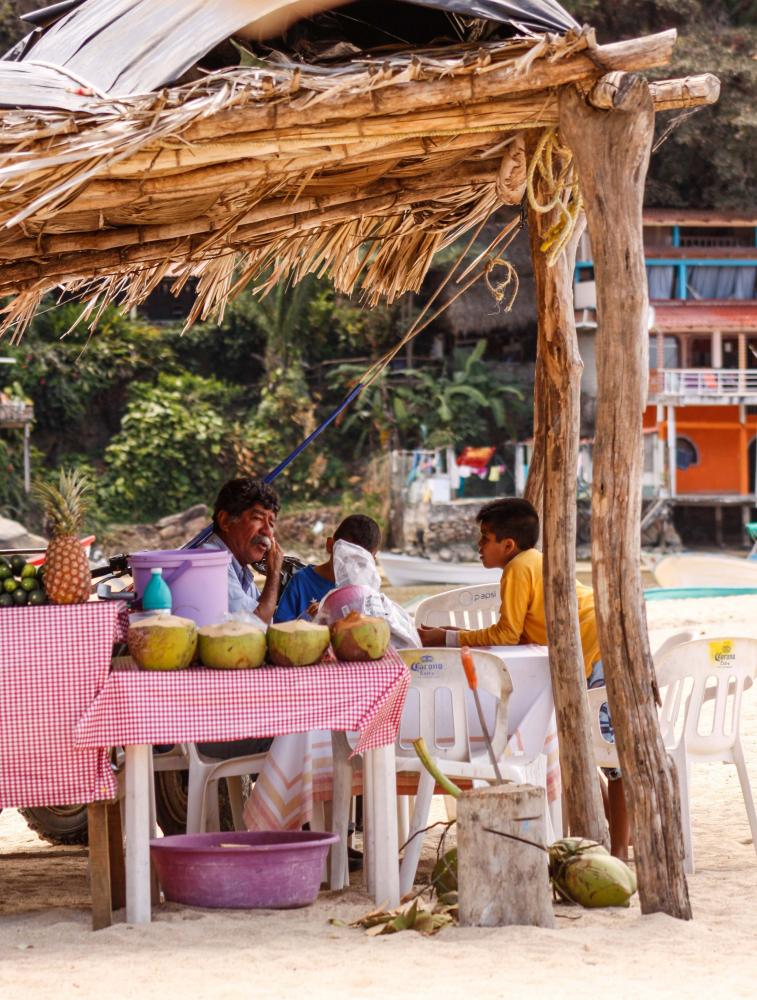 Yelapa’s beach head is dominated, like virtually every Mexican coastal town I’ve ever seen that has a modicum of shoreside sand, with shady palapas erected out of bamboo or palm trunk pillars that support a lattice work of bamboo and assorted branches. These are thatched with ranked layers of palm fronds and fronted with ranks of Pacifico and Corona umbrellas. Dining furniture is unwaveringly comprised of flimsy white or green plastic patio chairs and tables, most often spread with red or green table cloths that are held vaguely down against the sea breeze by an array of salt, pepper, and picante sauce containers. Although the food is generally pretty good and the service typical Mexican cordial, it’s the shade and the cold drinks that are the primary attraction.
Yelapa’s beach head is dominated, like virtually every Mexican coastal town I’ve ever seen that has a modicum of shoreside sand, with shady palapas erected out of bamboo or palm trunk pillars that support a lattice work of bamboo and assorted branches. These are thatched with ranked layers of palm fronds and fronted with ranks of Pacifico and Corona umbrellas. Dining furniture is unwaveringly comprised of flimsy white or green plastic patio chairs and tables, most often spread with red or green table cloths that are held vaguely down against the sea breeze by an array of salt, pepper, and picante sauce containers. Although the food is generally pretty good and the service typical Mexican cordial, it’s the shade and the cold drinks that are the primary attraction.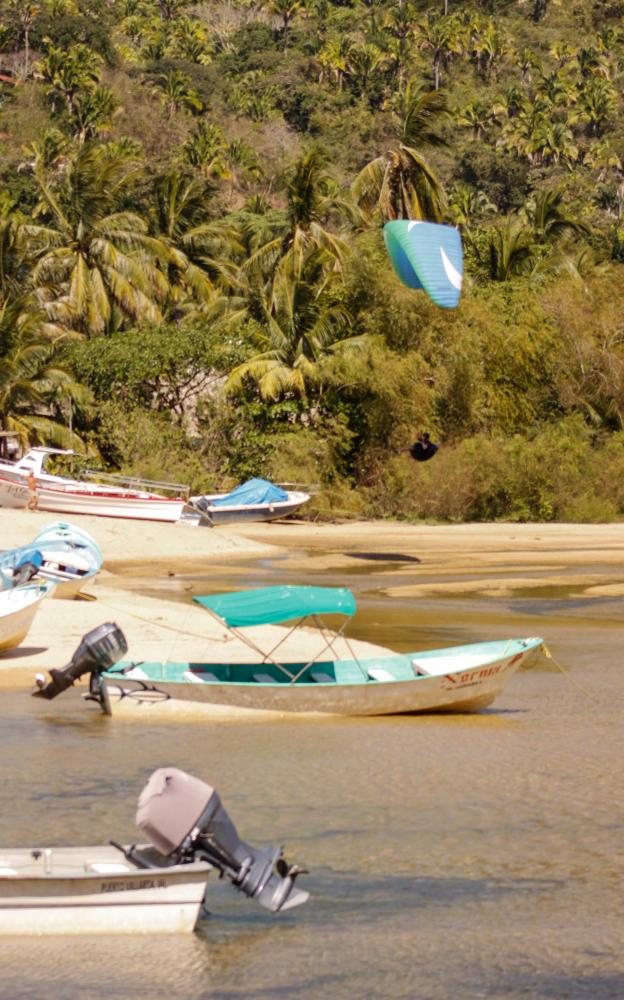 After doing battle with the usual seaside parade of wizened indigenous women and parched old men (one claiming to be one of Edgar’s uncles, …that’s another blog topic of its own) hawking all sorts of trinkets and gewgaws, we levered ourselves out of this warm, but shady setting and braved the glaring sand to walk down the beach toward town. On the way we paused to watch as several paragliders maneuvered their colorful canopies into an upwind approach over the lush, green tropical slopes to land on the narrow nape of beach between the estuary and the bay. Trudging onward under the distant gaze of blue herons, snowy-white cranes, and buzzards with their scaley, red heads, we crossed a narrow rill of water escaping vigorously through the shore into the ocean. On the other side we found hand-painted signage to point us toward the town and the waterfall.
After doing battle with the usual seaside parade of wizened indigenous women and parched old men (one claiming to be one of Edgar’s uncles, …that’s another blog topic of its own) hawking all sorts of trinkets and gewgaws, we levered ourselves out of this warm, but shady setting and braved the glaring sand to walk down the beach toward town. On the way we paused to watch as several paragliders maneuvered their colorful canopies into an upwind approach over the lush, green tropical slopes to land on the narrow nape of beach between the estuary and the bay. Trudging onward under the distant gaze of blue herons, snowy-white cranes, and buzzards with their scaley, red heads, we crossed a narrow rill of water escaping vigorously through the shore into the ocean. On the other side we found hand-painted signage to point us toward the town and the waterfall.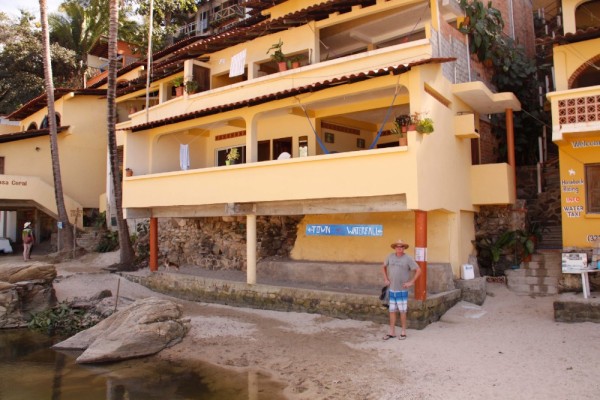 The uneven, winding concrete steps tunneled upwards through a narrow, crevice-like passage that opened out past a dusky wooden door framed in red painted brick and onto a cement pathway that continued to climb in more gentle slopes and occasional steps up into town. Widening as it led us on, the path was bordered by lush hillside on the left and a jumble of rough buildings on the right. Helter-skelter as they were, the homes and businesses were mostly well maintained, often bragging the bright blues, yellows and greens I’ve come to expect of Mexican towns. Now and then the buildings were interspersed with a half-finished or abandoned structure, but the overall impression was of a town that was happy and at least modestly prosperous. Even the incomplete buildings seemed to speak of hope suspended, not abandoned.
The uneven, winding concrete steps tunneled upwards through a narrow, crevice-like passage that opened out past a dusky wooden door framed in red painted brick and onto a cement pathway that continued to climb in more gentle slopes and occasional steps up into town. Widening as it led us on, the path was bordered by lush hillside on the left and a jumble of rough buildings on the right. Helter-skelter as they were, the homes and businesses were mostly well maintained, often bragging the bright blues, yellows and greens I’ve come to expect of Mexican towns. Now and then the buildings were interspersed with a half-finished or abandoned structure, but the overall impression was of a town that was happy and at least modestly prosperous. Even the incomplete buildings seemed to speak of hope suspended, not abandoned.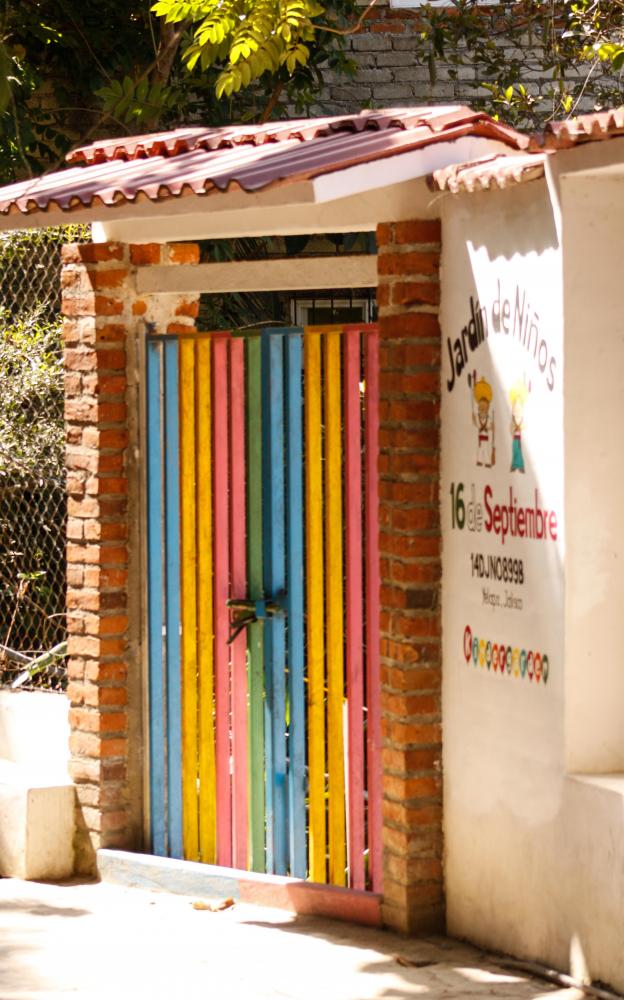 On our first visit, Kevin and I wandered aimlessly through Yelapa, admiring the relaxed, Third World ambiance. After a stop for beers and a pee at a cool, verandaed restaurant/bar, we finally had to turn around to make our appointment with Edgar for the shuttle ride back to Mabrouka. The second time was aboard Andante, and Jared, Amanda, Nick and Heather, Kevin and I started in much the same way, with lunch and drinks in the shade of Domingo’s Pacifico umbrellas, but somehow we ended up with more time and could indulge in the walk up to the waterfall just above town.
On our first visit, Kevin and I wandered aimlessly through Yelapa, admiring the relaxed, Third World ambiance. After a stop for beers and a pee at a cool, verandaed restaurant/bar, we finally had to turn around to make our appointment with Edgar for the shuttle ride back to Mabrouka. The second time was aboard Andante, and Jared, Amanda, Nick and Heather, Kevin and I started in much the same way, with lunch and drinks in the shade of Domingo’s Pacifico umbrellas, but somehow we ended up with more time and could indulge in the walk up to the waterfall just above town.It’s a cool stroll that climbs up a gentle slope along a paved path past a sparse procession of buildings in various dubious states of either construction or decay, …it’s hard to tell which. The chilly pool sat like a jewel enveloped in refreshing mists that drifted off the flowing cliff face, making the grey rock walls of the grotto glisten in the half-light. The small grotto was draped in dark green and brown curtains of looping vines, broad-leafed trees, tall palms, and quivering ferns and a patch of sunlight hovered overhead to highlight the modest white beard of water that tumbled down from the mountain.
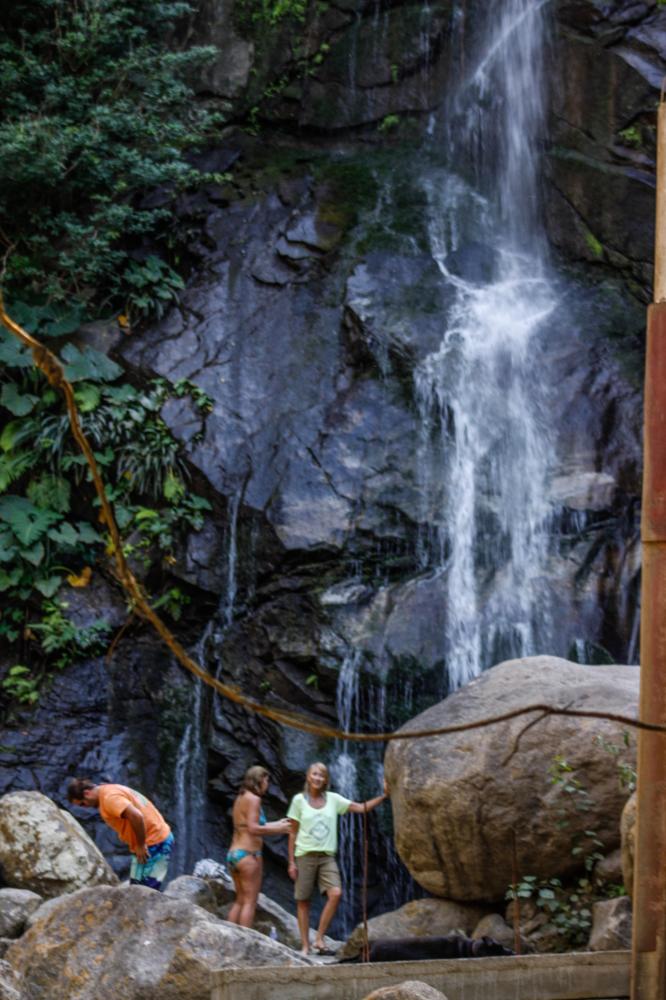 I guess our mid-March visit was not coincidental with the tourist season, because we were virtually the only visitors. Even so, a knick-knack concession had it’s tourist wares spread in hopeful display just down the trail and the small, pool-side bar offered ice-cold beers for refreshment as we sat on the flimsy white plastic lawn chairs to take our pleasure in the cool half-light of the rocky patio overlooking the water.
I guess our mid-March visit was not coincidental with the tourist season, because we were virtually the only visitors. Even so, a knick-knack concession had it’s tourist wares spread in hopeful display just down the trail and the small, pool-side bar offered ice-cold beers for refreshment as we sat on the flimsy white plastic lawn chairs to take our pleasure in the cool half-light of the rocky patio overlooking the water.Yelapa certainly exhibits a more tropically exotic feeling than most of the places I’ve visited in Mexico so far, but it is perhaps indicative of the welcoming nature of what I expect to encounter all down the mainland Mexican coast. I would like to have stayed to enjoy the town for at least a couple of days, but the dubious anchorage is discouraging of that. Chacala boasts a lesser example of Yelapa’s welcoming atmosphere. It’s just a casual day or two’s motor-sail to the north, but with a much more welcoming anchorage. In any case, Yelapa should not be missed.
Partly, I think, it’s the moderately sized bay with its parenthesis of palapa-rimmed beach that makes up the idyllic scene that Yelapa typifies for me, but what gives it life is the content human activity. The fishermen are constantly charging through in their pangas, driving up on the sand to discharge the catch of the day to confederates on the beach, then hauling their boats out to trailer them home or heading back to sea for more fish. Then there’s the trickle of vendors trying to make their subsistence livings with hats piled on their heads, blankets slung over their shoulders, or trays overflowing with charms and bracelets to sell to their tourist benefactors.
These shore-side towns, universally modest, but filled with colorful, bustling, noisy life and buildings painted to match, do much to recommend visiting Mexico, whether by boat or any other means.
| Vessel Name: | Mabrouka |
| Vessel Make/Model: | CT-41 |
| Hailing Port: | Seattle, WA |
| Crew: | Roy Neyman |
| About: | |
| Extra: |
Mabrouka's Photos - Main
Photo 5 of 10 | Back To Album |
This is Swan as I knew him, though in a more rugged environment than we ever shared. We usually met at the coffee shop or at Voula's for breakfast.
Added 11 April 2014
Who are we and where are we going?
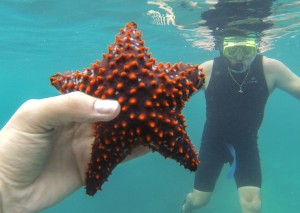
Who: Roy Neyman
Port: Seattle, WA
Blog Entries (newest to oldest)
Favorites
- S/V Valella
- S/V Bint al Khamseen
- S/V Estrellita 5.10b
- S/V Infini
- S/V Soggy Paws
- Coho Ho Ho Sailing Rallye
- Tyee Yacht Club
- Dreamspeaker Cruising Guides
- Wendy Hinman, Tightwads on the Loose
- Iverson's Designs - Dodgers
- Portland Pudgy
- WH Auto Pilot System
- Cool Blue Refrigeration System
- Forespar Whisker Pole
- Sea Tech SSB Radio
- Precision Temp ShowerMate Water Heater
- Ed Foster - Marine & Off-Grid LEDs
- Quickline Storage Reel System
- Danbuoy Man Overboard Pole
- Sea Sensations






